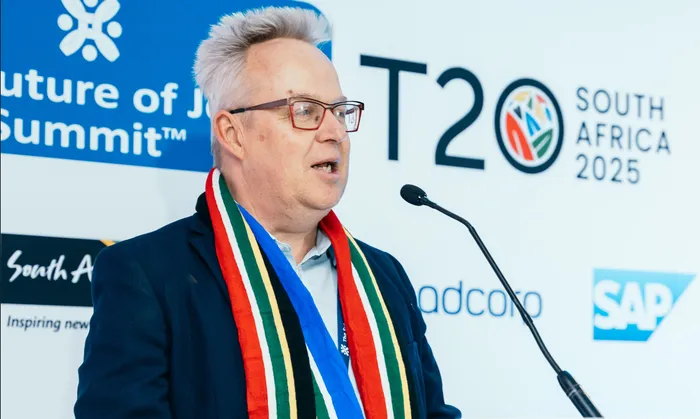R2 billion for Formula 1? Here’s why it could be South Africa’s smartest investment yet
PROSPER NATION

Dr Nik Eberl is the Founder & Executive Chair: The Future of Jobs Summit™ (Official T20 Side Event) .He will be writing a regular column in Business Report.
Image: Supplied
When news broke that hosting a Formula 1 Grand Prix in South Africa could cost as much as R2 billion, the headlines focused on the bill. The critics warned of wasteful spending. Parliament debated priorities. But while the accountants saw a liability, I saw something very different: 20 000 jobs waiting to be created and an economy in motion.
Yes, R2 billion is a significant investment. But as Singapore discovered when it launched its Grand Prix in 2008, the right event can pay for itself many times over. According to the Singapore Tourism Board, the race generates about S$150 million (R2bn) annually in visitor spending and economic impact. Independent studies put the return on investment at three to five times every dollar spent.
Apply those multipliers to South Africa, and you are looking at R6bn to R10bn circulating through our economy — from hotels and restaurants to construction, transport, media, and broadcast rights. And that’s before considering the long-term reputational benefits that mega-events create.
Because here’s the part of the equation that rarely makes it into political soundbites: the jobs don’t come from the race itself — they come from the ripple effects that the race sets in motion.
More Than a Weekend
Take Montreal. When it first hosted a Formula 1 race in 1978, roughly 2 000 people were employed directly for the event. Today, its motorsport sector — spanning events, tourism, suppliers, and services — sustains more than 13 000 jobs annually. These are not weekend positions. They represent a permanent industry cluster built around skills, suppliers, and global demand.
Or look at Singapore. When it signed its Formula 1 contract, critics called it frivolous. Today, the Grand Prix remains the city-state’s largest annual sporting event, drawing 250 000 visitors a year and boosting Singapore’s image far beyond the racetrack. The impact goes beyond the estimated R2bn in annual economic activity; it has repositioned Singapore from a purely financial centre to a dynamic global hub for innovation and entertainment.
That perception shift is more than PR. As I’ve learned from interviewing over 500 business and public leaders for my books on leadership and economic development, investment follows inspiration. Talent follows excitement. Innovation follows ambition. Formula 1 sends a message that South Africa is open for high-value industries, not just commodity exports.
Counting the Jobs
Sceptics ask: where do 20 000 jobs come from? The answer lies in the combined layers of direct, indirect, and induced employment.
Direct roles would include 2 000 track marshals, safety crews, and technical staff, along with 3 000 jobs in hospitality — from hotels to restaurants to transport operators. Preparing Kyalami for Grade 1 certification (it currently holds Grade 2 status) would generate another 5 000 construction and infrastructure jobs.
But those are just the immediate roles. The real economic spark comes from the opportunities created once the global spotlight turns to South Africa. Every international broadcast markets our capacity to host at the highest level. Every tourist becomes a brand ambassador. Every executive in the grandstands sees a nation capable of delivering excellence.
This is precisely what happened after the 2010 FIFA World Cup™. Leisure tourism jumped by 31% year on year following the tournament. Conference bookings doubled in the years that followed, particularly in Cape Town and Durban. And foreign investors — buoyed by renewed confidence in South Africa’s capabilities — increased their commitments the following year. The legacy wasn’t just in stadiums; it was in belief.
Beyond the Race Track
With the right vision, Formula 1 can catalyse more than temporary employment. It can become a platform for skill development and global integration.
Picture a young engineer in Durban trained in race technology, later hired by international motorsport suppliers. Imagine graduates in Soweto coding for European tech firms because South Africa is viewed as an innovation-friendly hub. Envision township-based catering companies servicing international teams, gaining the credibility to expand globally.
These outcomes don’t happen automatically. They require alignment — between the government, business, and civil society — to ensure that investment in mega-events translates into long-term capacity. But with the right structures in place, the pay-off can be immense.
Can We Afford Not To?
Kyalami is not yet ready for Formula 1. It needs safety upgrades, pit facilities, and media infrastructure to achieve Grade 1 certification. The projected R2bn cost is real. But so is the upside.
According to PwC and Oxford Economics, Formula 1 host cities typically generate between R1.8bn and R7.2bn annually from tourism, sponsorship, and media exposure. Job creation can reach 10 000 to 20 000 positions, depending on the scale of the supporting economy.
So, the question South Africa should ask is not, “Can we afford it?”
It’s, “Can we afford not to?”
In a world where automation threatens traditional industries and AI is set to transform entire sectors by 2027, South Africa needs catalysts for growth, skills, and global relevance. Formula 1 is not a silver bullet. But it is a proven accelerant.
When the engines roar to life at Kyalami — hopefully by 2027 — they will do more than start a race. They will start careers, launch businesses, and inspire ambition across a generation.
Because while critics debate costs, the real question is whether South Africa can afford to stand still. The world isn’t waiting. And the future, much like Formula 1 itself, is already racing toward us at 300 kilometres per hour.
Dr Nik Eberl is the Founder & Executive Chair: The Future of Jobs Summit™ (Official T20 Side Event) and author of Nation of Champions: How South Africa won the World Cup of Destination Branding.
*** The views expressed here do not necessarily represent those of Independent Media or IOL.
BUSINESS REPORT